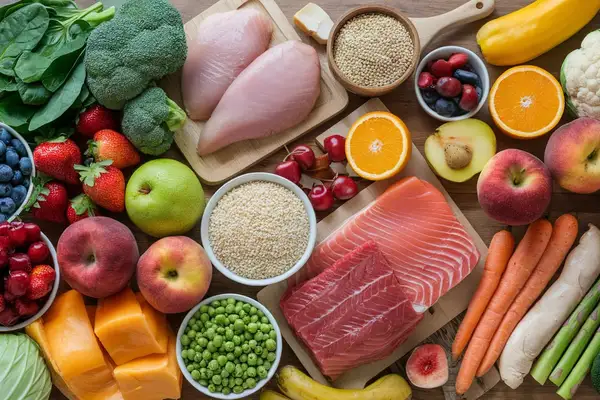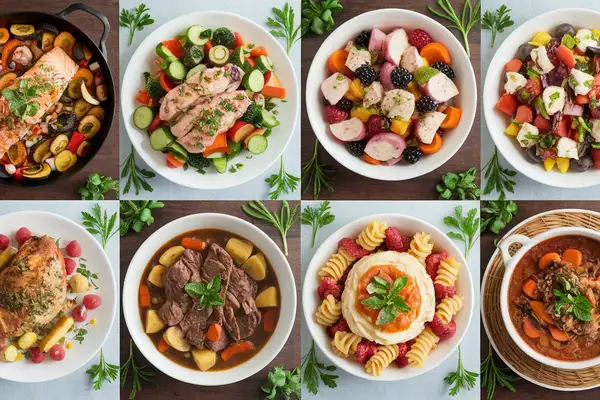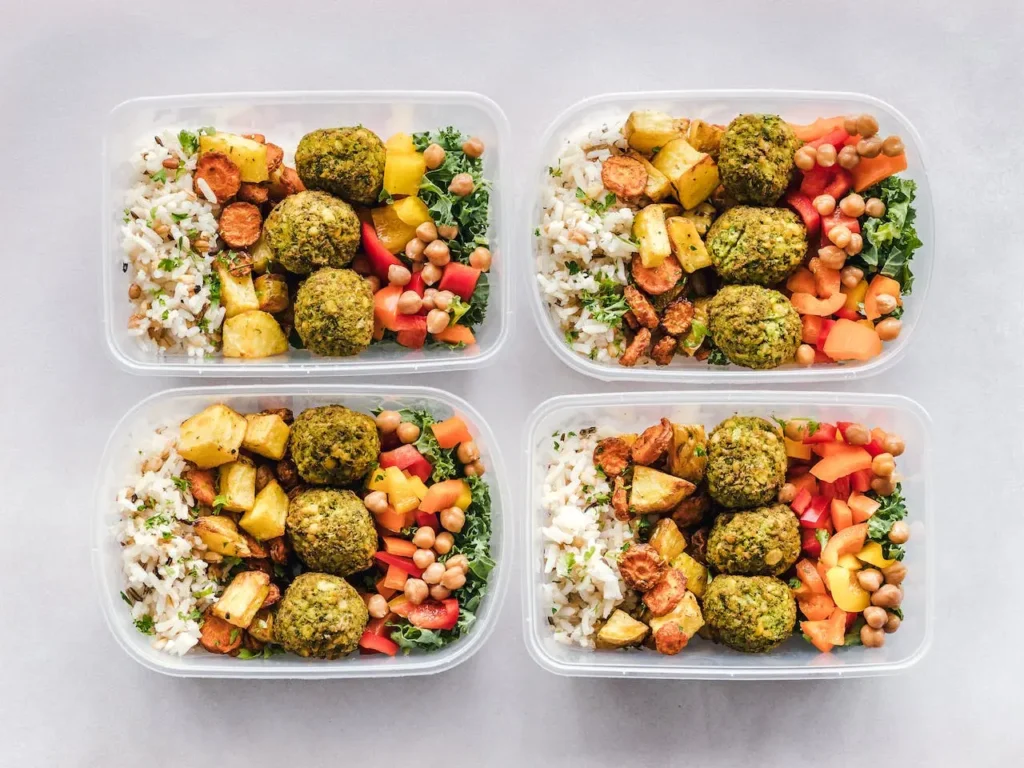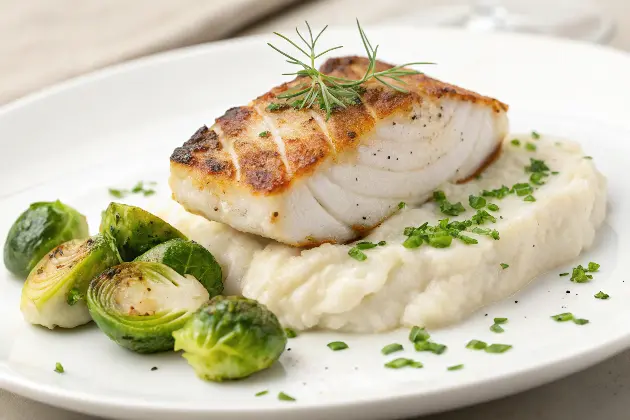7-Day Meal Plan for Ulcerative Colitis: Foods To Eat & Avoid
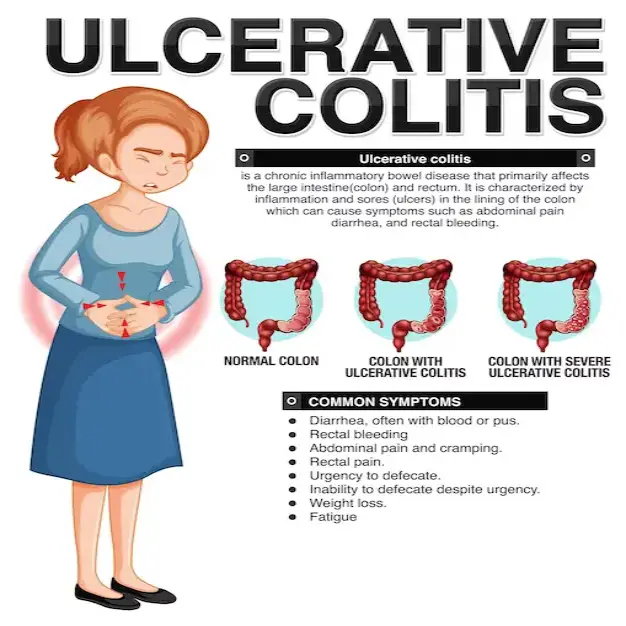
This post may contain affiliate links, meaning I may earn a commission if you make a purchase, at no extra cost to you. I only recommend products I trust. Thank you for your support.
Ulcerative Colitis is a chronic inflammatory bowel disease that primarily affects the colon and rectum.
It causes inflammation and ulcers in the digestive tract, leading to symptoms such as abdominal pain, diarrhea, and rectal bleeding.
Managing this condition requires a comprehensive approach, and one important aspect is following a well-designed Ulcerative Colitis diet.
A 7-day meal plan for Ulcerative Colitis is vital for several reasons. Firstly, it helps to alleviate symptoms and reduce the frequency of flare-ups.
Secondly, it ensures that you consume a balanced diet that provides essential nutrients to support your digestive health.
Lastly, a structured 7-day meal plan for ulcers helps you stay organized and makes it easier to adhere to dietary guidelines consistently.
In this guide, we offer a comprehensive 7-Day Meal Plan for Ulcerative Colitis tailored specifically to support individuals with this condition.
This 7-Day Meal Plan for Ulcerative Colitis is designed to provide nutritious and easily digestible meals for ulcerative colitis aimed at minimizing symptoms, promote gut health, and reduce inflammation.
7-Day Meal Plan for Ulcerative Colitis
This 7-day meal plan for ulcers includes a variety of soothing, easily digestible meals aimed to soothe your stomach, minimize irritation, and reduce inflammation.
Whether you’re dealing with a flare up or aiming to maintain long term digestive health, this ulcerative colitis diet plan offers delicious and ulcer friendly foods to keep you feeling your best.
Below is a well-rounded example of a 7 day meal plan for Ulcerative Colitis:
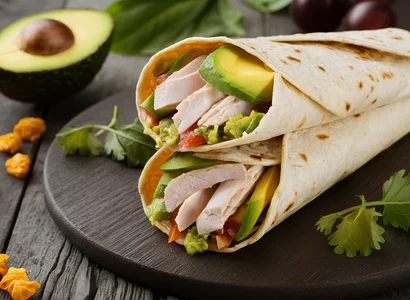
Day 1
Breakfast:
- Oatmeal topped with fresh berries and a drizzle of honey (1/2 to 1 cup of cooked oatmeal and a handful of berries)
- Scrambled eggs with spinach and a side of gluten-free toast (2 scrambled eggs with a handful of spinach and 1 slice of gluten-free toast)
Lunch:
- Quinoa salad with mixed vegetables, roasted chicken, and herbs (1 to 1.5 cups of salad)
- Turkey wrap with lettuce, cucumber, avocado, and carrot sticks (1 whole wrap with a side of 1/2 cup of carrot sticks)
Dinner:
- Baked salmon with steamed broccoli and quinoa (4 to 6 ounces of salmon, 1 cup of steamed broccoli, and 1/2 to 1 cup of quinoa)
- Grilled chicken breast with roasted sweet potatoes and sautéed kale (4 to 6 ounces of chicken breast, 1 medium sweet potato, and 1 cup of sautéed kale)
Snacks:
- Banana with almond butter (1 medium banana with 1 to 2 tablespoons of almond butter)
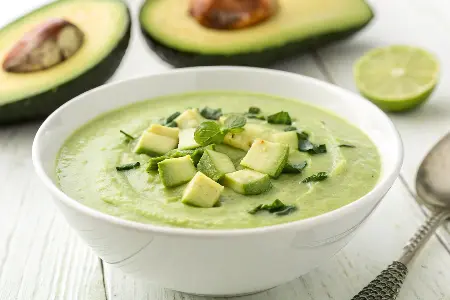
Day 2
Breakfast:
- Smoothie blend of spinach, banana, almond milk, and protein powder (1 to 1.5 cups of smoothie)
Lunch:
- Mixed greens, grilled chicken with olive oil and avocado dressing (1 to 1.5 cups of salad)
- Avocado and cucumber soup with soft bread (1 to 1.5 cups of chilled avocado and cucumber soup blended with yogurt and herbs, served with 1 slice of soft whole wheat or sourdough bread)
Dinner:
- Baked cod with roasted broccoli and quinoa (4 to 6 ounces of cod with 1/2 to 1 cup of broccoli and 1/2 to 1 cup of quinoa)
Snacks:
- Greek yogurt topped with almonds and honey (1 small bowl of yogurt with 1 tablespoon of almonds and a drizzle of honey)
- Gluten-free crackers with hummus (5 to 7 crackers with 2 tablespoons of hummus)
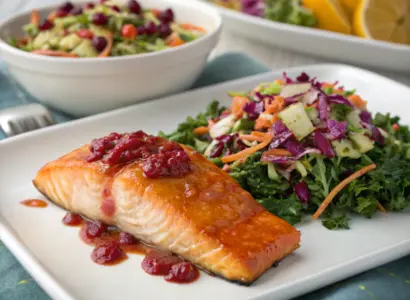
Day 3
Breakfast:
- Avocado and egg toast (1-2 slices of whole grain toast with 1/2 avocado and 1 egg)
Lunch:
- Baked cod with mashed potatoes and sautéed spinach (4 to 6 ounces of cod fillet with 1 cup of mashed potatoes and a side of sautéed spinach)
Dinner:
- Grilled salmon with kale and white rice (4 to 6 ounces of grilled salmon with 1 cup of cooked plain white rice and a side of steamed or sautéed kale)
Snacks:
- Buffalo chickpea wrap (1 wrap with buffalo chickpea filling)
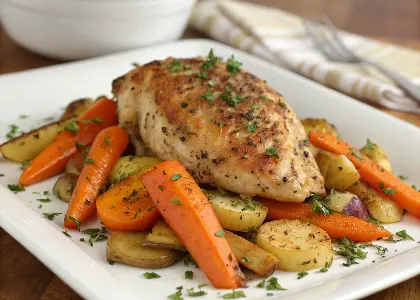
Day 4
Breakfast:
- Spinach and feta omelet with gluten-free toast (2 to 3 eggs for the omelet with 1 slice of gluten-free toast)
- Bowl of gluten-free cereal with almond milk and berries (1 cup of cereal with 1 cup of almond milk and a handful of berries)
Lunch:
- Grilled chicken breast with roasted sweet potatoes and carrots (4 to 6 ounces of skinless chicken breast with 1 cup of roasted sweet potatoes and a side of steamed carrots)
- Turkey and vegetable wrap with cucumber slices (1 wrap with 1 cup of cucumber slices)
Dinner:
- Grilled shrimp skewers with zucchini noodles (4 to 6 ounces of shrimp with 1 to 1.5 cups of zucchini noodles)
Snacks:
- Rice cake with avocado (1 rice cake with 1/2 avocado)
- Fruit salad (1 to 1.5 cups of fruit salad with a variety of fruits)
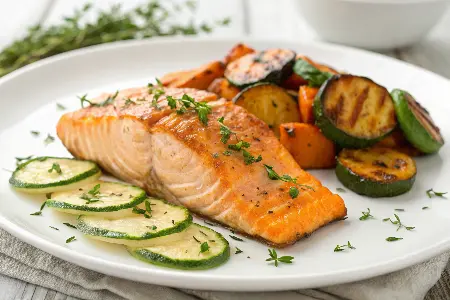
Day 5
Breakfast:
- Green smoothie with spinach, kale, banana, and almond milk (1 to 1.5 cups of smoothie)
Lunch:
- Cucumber salad with grilled chicken and salad dressing (1 to 1.5 cups of salad with 4 to 6 ounces of grilled chicken)
- Quinoa and black bean salad with avocado (1 to 1.5 cups of salad)
Dinner:
- Baked salmon with sweet potato and zucchini (4 to 6 ounces of salmon with 1 medium sweet potato and a side of sautéed or roasted zucchini)
- Vegetable stir-fry over steamed white rice (1 to 1.5 cups of stir-fry served over 1 cup of plain white rice)
Snacks:
- Baked kale chips (1 to 1.5 cups of kale chips)

Day 6
Breakfast:
- Greek yogurt parfait with fresh berries and a sprinkle of granola (1 cup of yogurt and a handful of berries)
Lunch:
- Slow-cooker chicken with pumpkin and white rice (4 to 6 ounces of slow-cooked chicken breast with 1 cup of tender pumpkin chunks and 1 cup of steamed white rice)
- Spinach and feta salad with grilled chicken (1 to 1.5 cups of salad with 4 to 6 ounces of grilled chicken)
Dinner:
- Grilled chicken breast with roasted sweet potatoes and sautéed spinach (4 to 6 ounces of chicken with 1 cup of sweet potatoes and 1 cup of spinach)
- Lentil curry with coconut milk (1 to 1.5 cups of lentil curry)
Snacks:
- Roasted chickpeas or rice cake with almond butter and banana (1/4 to 1/2 cup of roasted chickpeas or 1 rice cake with 1 tablespoon of almond butter and 1/2 sliced banana)

Day 7
Breakfast:
- Chia seed pudding with mango puree (1 to 2 cups)
Lunch:
- Mixed greens salad with cottage cheese and olive oil (1 to 1.5 cups of salad with 3 to 4 ounces of cottage cheese)
- Turkey and avocado wrap with cucumber slices (1 wrap with 3 to 4 slices of cucumber)
Dinner:
- Grilled chicken with green beans and sweet potato mash (4 to 6 ounces of grilled chicken breast with 1 cup of sweet potato mash and a side of steamed or sautéed green beans)
- Vegetarian stir-fry over white rice (1 to 1.5 cups of stir-fry with 1/2 to 1 cup of white rice)
Snacks:
- Pear and cheese slices (1 medium pear with 1 to 2 ounces of cheese)
Best Food for Ulcers
When planning a 7-day meal plan for ulcerative colitis, it’s important to include foods that are gentle on the digestive system and provide essential nutrients.
Here’s a breakdown of the recommended foods to include in a 7-day meal plan for ulcerative colitis:
1. Lean Proteins
- Chicken: Grilled or baked chicken breasts or thighs can provide a good source of lean protein.
- Turkey: Lean ground turkey or turkey breast can be included in meals for a low-fat protein option.
- Fish: Salmon, trout, and white fish varieties are easily digestible and rich in omega-3 fatty acids.
- Tofu: Tofu is a plant-based protein that can be included in stir-fries or as a meat substitute.
2. Low-Residue Carbohydrates
- White Rice: Plain white rice is easy to digest and can be used as a base for meals.
- White Bread: White bread or sourdough bread may be easier on the digestive system compared to whole grain bread.
- Refined Pasta: Pasta made from refined flour can be included in moderation as part of a low-residue diet.
3. Cooked Vegetables
- Carrots: Well-cooked and peeled carrots can provide vitamins and fiber without being too harsh on the digestive system.
- Green Beans: Cooked green beans are a gentle source of fiber and nutrients.
- Zucchini: Soft and cooked zucchini can be included in various dishes without causing digestive distress.
4. Ripe Fruits
- Bananas: Ripe bananas are a good source of potassium and are generally well-tolerated.
- Melons: Watermelon and cantaloupe are low-acid fruits that can be gentle on the stomach.
- Canned Fruits in Natural Juices: Canned fruits such as peaches or pears in natural juices can provide a sweet treat without added sugars.
5. Probiotic Foods
- Yogurt with Live Cultures: Plain yogurt with live cultures can support gut health and provide beneficial probiotics.
- Fermented Foods: Kimchi and miso are fermented foods that can introduce beneficial bacteria to the gut.
6. Healthy Fats
- Olive Oil: Extra virgin olive oil can be used for cooking or as a dressing for salads.
- Avocado: Avocado is a source of healthy monounsaturated fats and can be included in sandwiches or salads.
- Nut Butters: Natural nut butters like almond or cashew butter can provide healthy fats and protein.
7. Beverages
- Adequate Water Intake: Drinking plenty of water throughout the day is essential for maintaining hydration and supporting digestive function.
- Herbal Teas: Non-caffeinated herbal teas such as chamomile or ginger tea can be soothing and help maintain hydration.
Worst Food For Ulcers
When creating a meal plan for ulcerative colitis, it’s important to avoid certain foods that can trigger symptoms and exacerbate the condition.
By avoiding these foods and paying attention to individual triggers, it’s possible to create a meal plan that supports digestive health and helps manage ulcerative colitis effectively.
Here are some foods to avoid when planning a 7 day meal plan for ulcerative colitis:
1. Acidic Foods:
Acidic foods can irritate the stomach lining and exacerbate ulcer symptoms. These include:
- Citrus fruits such as oranges, lemons, and grapefruits
- Tomato-based products like tomatoes, tomato sauce, ketchup, and salsa
- Vinegar-based dressings and pickled foods
2. High-Fiber Foods:
Whole grains, nuts, seeds, and raw vegetables can be difficult to digest and may worsen symptoms. These include:
- Whole grain bread and cereals
- Whole nuts and seeds
3. Dairy Products:
Dairy products can increase stomach acid production, potentially worsening ulcer symptoms. These include:
- Whole milk and cream
- Full-fat cheeses
- Ice cream and butter
4. Spicy Foods:
Spicy foods can irritate the stomach lining and aggravate ulcer symptoms. These include:
- Hot peppers such as jalapeños, habaneros, and chili peppers
- Spicy sauces like hot sauce and sriracha
- Dishes with heavy spices, including curries and chili
5. High-Fat Foods:
Fried and greasy foods can be hard to digest and may lead to diarrhea and abdominal discomfort. Limit the consumption of:
- Fried foods
- Butter and margarine
- Fatty cuts of meat
6. High-Sugar Foods:
High-sugar foods and beverages can contribute to inflammation and may upset the digestive system. Avoid or limit:
- Sugary snacks and desserts
- Sweetened beverages like soda and fruit juices
7. Alcohol and Caffeine:
- Both alcohol and caffeine can irritate the digestive system and lead to dehydration. It’s best to minimize or avoid alcoholic beverages and caffeinated drinks.
8. Artificial Sweeteners:
- Sugar alcohols and artificial sweeteners can have a laxative effect and may exacerbate diarrhea. Check food labels for ingredients like sorbitol, mannitol, and aspartame.
Ulcer Diet Tips
Creating a 7-day meal plan for ulcerative colitis is not a one-size-fits-all approach. It’s important to adapt the plan to your individual preferences and dietary restrictions.
Here are some tips for customizing a 7 day meal plan for ulcerative colitis to align with your preferences:
- Eat Small, Frequent Meals: Instead of three large meals, try eating smaller portions more frequently throughout the day. This helps prevent your stomach from becoming too full and reduces acid production.
- Avoid Trigger Foods: Identify and avoid foods that trigger your symptoms. Common culprits include spicy foods, acidic foods, and high-fat items.
- Choose Gentle Proteins: Opt for easy-to-digest proteins like eggs, tofu, or poached chicken. These are less likely to irritate your stomach lining.
- Incorporate Fiber Carefully: While fiber is important, choose low-fiber options like cooked vegetables and peeled fruits. Avoid raw vegetables and whole grains if they cause discomfort.
- Stay Hydrated: Drink plenty of water throughout the day, but avoid drinking large amounts with meals, as this can increase stomach pressure.
- Limit Caffeine and Alcohol: Both caffeine and alcohol can irritate the stomach lining and increase acid production, so it’s best to limit or avoid them.
- Cook Foods Thoroughly: Cooking methods like steaming, boiling, or baking can make foods easier to digest, reducing the risk of irritation.
- Avoid Late-Night Eating: Try to have your last meal at least two to three hours before bedtime to prevent nighttime acid reflux.
- Manage Stress: Stress can worsen ulcer symptoms, so practice relaxation techniques like deep breathing, meditation, or gentle exercise.
Resources
We referred to these sources to generate the 7-day meal plan for Ulcerative Colitis.
- Mayo Clinic – Ulcerative Colitis.
- Crohn’s & Colitis Foundation – Diet, Nutrition, and Inflammatory Bowel Disease.
- Johns Hopkins Medicine – Inflammatory Bowel Disease Diet.
- Inflammatory Potential of the Diet and Risk of Ulcerative Colitis.
- Dietary Inflammatory Potential and Risk of Crohn’s Disease and Ulcerative Colitis.
Conclusion
Creating a 7-day meal plan for Ulcerative Colitis is a proactive step towards managing your digestive health and reducing symptoms.
By understanding the impact of your food choices, structuring your meals appropriately, and considering lifestyle factors, you can optimize your well-being and empower yourself in managing Ulcerative Colitis.
Remember, it’s crucial to tailor the 7-day meal plan for ulcers to your preferences, dietary restrictions, and consult with healthcare professionals when needed.
With the right approach and support, you can take control of your condition and live a fulfilling life.
- Carnivore diet food list
- Carb cycling meal plan
- Chron’s Disease diet plan
- 7-day low sodium meal plan
- 7 day meal plan for kidney disease
- Benefits of eating green bananas
- Prediabetic meal plan
- 7 day meal plan for prediabetes
- 7 day Daniel Fast meal plan
- Easy mediterranean diet breakfast recipes
- Intermittent fasting meal plan for beginners
- 30-day low FODMAP meal plan
Frequently Asked Questions (FAQs)
How long should I follow the 7-day meal plan for ulcers?
The duration of the 7-day meal plan for ulcers can vary for each individual. It’s important to monitor your symptoms and consult with a healthcare professional for guidance on the appropriate duration.
Can a 7-day meal plan completely cure Ulcerative Colitis?
While a 7-day meal plan for Ulcerative Colitis can help manage symptoms and reduce flare-ups, there is currently no known cure for Ulcerative Colitis.
The 7-day meal plan for Ulcerative Colitis is a part of a comprehensive approach that includes medication, lifestyle changes, and regular medical care.
Are there any supplements that can help with Ulcerative Colitis?
Some supplements, such as omega-3 fatty acids and probiotics, may have potential benefits for individuals with Ulcerative Colitis.
However, it’s important to consult with a healthcare professional before starting any supplements to ensure their safety and effectiveness.
Can I modify the meal plan if I have other dietary restrictions or allergies?
Certainly! The 7-day meal plan for Ulcerative Colitis can be modified to accommodate dietary restrictions or allergies.
Substitute ingredients that meet your specific needs, and consult with a registered dietitian or healthcare provider for further guidance.
How can I ensure I’m getting enough nutrients with the 7-day meal plan for ulcers?
The 7-day meal plan for ulcers constitutes lean proteins, complex carbohydrates, healthy fats, and fiber-rich food providing a balanced diet.
Citations
- Radziszewska M, Smarkusz-Zarzecka J, Ostrowska L, Pogodziński D. Nutrition and Supplementation in Ulcerative Colitis. Nutrients. 2022 Jun 14;14(12):2469. doi: 10.3390/nu14122469. PMID: 35745199; PMCID: PMC9231317.
- Lamb CA, Kennedy NA, Raine T, Hendy PA, Smith PJ, Limdi JK, Hayee B, Lomer MCE, Parkes GC, Selinger C, Barrett KJ, Davies RJ, Bennett C, Gittens S, Dunlop MG, Faiz O, Fraser A, Garrick V, Johnston PD, Parkes M, Sanderson J.
